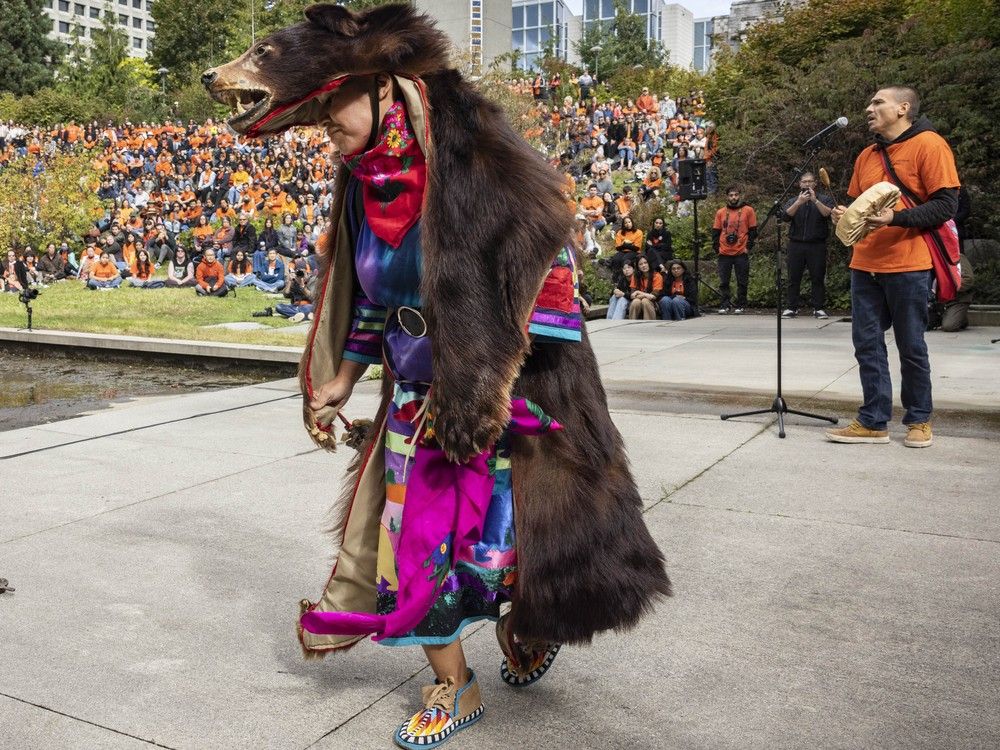
Ten years after the report into abuses at Canada’s Indigenous residential schools and five years since Sept. 30 became a national day of recognition, a school survivor gave his testimony in front of hundreds who gathered to mark the day at UBC.
Sam George, an elder from Squamish Nation in North Vancouver, standing with the help of a cane, recounted his experiences, which included getting the strap, being served meagre meals and watching children getting beaten for speaking their native language.
He recalled how on the first day of school at St. Paul’s in North Vancouver, he watched two boys speaking in their own languages being hit by a nun with a yardstick and being punched while being ordered to speak only English.
“That was my very first day at school. Trauma and fear,” said George, who spent eight years there and said the abuse against him included sexual abuse when he got older.
He recalled how when the children walked to church on Sundays, their parents would line the streets as they passed, “because that was the only way they could see us,” he said. And they would secretly hand their children bannock — fried bread — “and sometimes it would still be warm.”
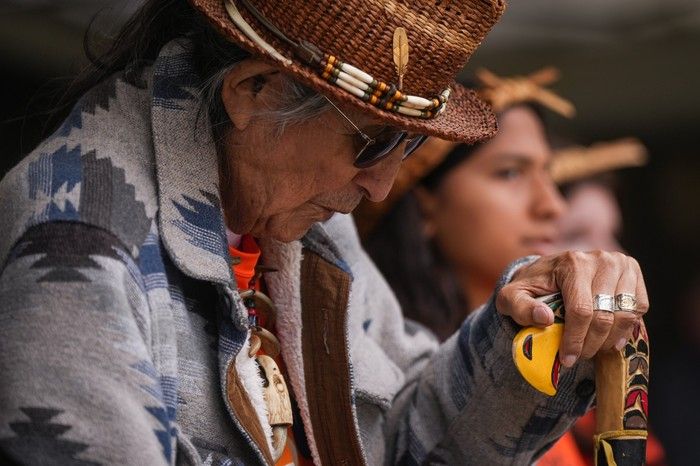
George’s testimony was part of a 90-minute ceremony marking the National Day for Truth and Reconciliation and just one of many events that took place in B.C. and across Canada.
At the Vancouver Aquarium, Squamish Nation author Lisa Lewis led storytelling and craft sessions, Squamish Nation elder Bob Baker talked about his residential school experience, and the Museum and Archives of North Vancouver offered hands-on crafts and games to teach about the history of Indigenous rights.
And on Granville Island, the Arts Umbrella honoured school survivors and their families and those who never made it home and the Vancouver Aboriginal Health Society was one of the organizers of an event offering cultural performances, a sacred fire and Indigenous market.
At UBC, where the theme was the intergenerational trauma passed on to descendants of school survivors, student drummers from across Canada performed two songs, which participants were asked not to record out of respect for their sacredness.
“Each one of us has been affected by the residential school system and these are songs of prayer and we’re here to pray,” said one of the young drummers.
Each of the students introduced themselves in their own language before, in English, naming family members and ancestors they were drumming and praying for.
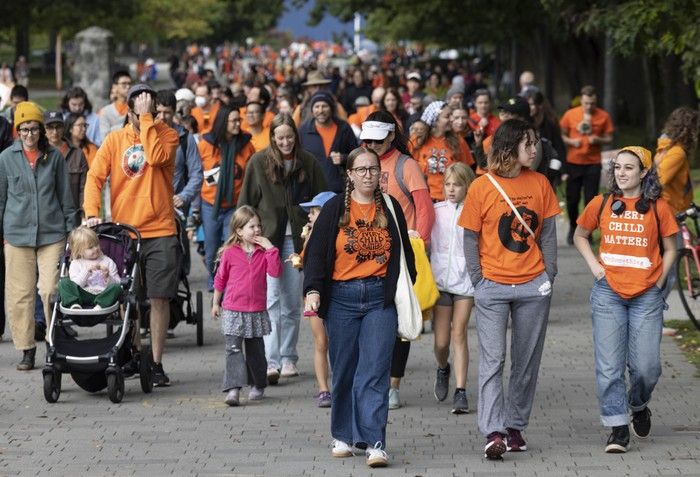
Mitchell Tourangeau said he and his family were affected by not only the residential school system but by Canada’s policy when his parents were younger of adopting Indigenous children in the 1960s out of their communities in what’s known as the Sixties Scoop.
The sexual, physical, emotional and spiritual abuse began before he was born when his pregnant mother was beaten by his alcoholic father. He said her anxiety, fear and shame affected him growing up and led him to feeling ashamed of who he was.
“I came into the world feeling that. I was never good enough” in his mind, and while playing with other kids, “I was always being called dirty Indian, this and that,” he said.
He said his healing has been helped by becoming sober 12 years ago, which he was able to do through cultural spiritual practices.
After the ceremony, part of the estimated 500 people in attendance, many wearing orange, marched to the Thunderbirds Commons Field on campus for more speeches.
The residential school era is the period between 1857 and 1996 when 150,000 Indigenous children were forced to attend church-run, government-funded, schools.
They were barred from speaking their languages in institutions often rife with abuse and located far away from their families and communities.
An estimated 6,000 children died while attending the schools, although experts say the actual number could be much higher.
Sept. 30, known as Orange Shirt Day or the National Day for Truth and Reconciliation, is meant to honour survivors and those who never came home.
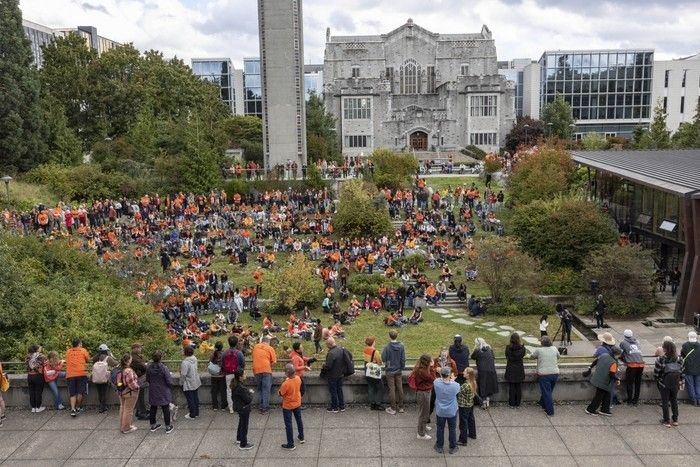
In Ottawa, Prime Minister Mark Carney said reconciliation is “a generational task, lived and practised every day.”
“Canada’s new government will be a steadfast partner by respecting self-determination, by prioritizing Indigenous equity and co-ownership as vital principles of building,” Carney said.
“The stark truth about the residential school system and the stories bravely shared by survivors in the report’s six volumes sparked a national awakening” 10 years ago, said Gov. Gen. Mary Simon, who made history in 2021 when she became the first Indigenous person to be appointed to that role.
She said in a statement that while schools today are embracing an inclusive history, denialism and discrimination persist.
“Let’s keep building a country where all peoples — Indigenous and non-Indigenous — can truly thrive and face the challenges ahead,” Simon wrote.
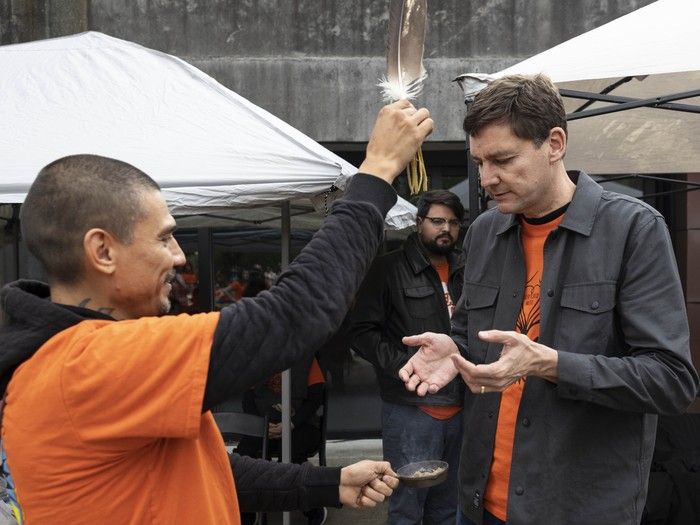
The calls to action in the Truth and Reconciliation Commission report in 2015 called for governments to reduce the number of Indigenous children in care, eliminate educational and employment gaps between Indigenous and non-Indigenous and address the distinct health needs of the Métis, Inuit, and off-reserve Indigenous peoples.
Others included recommendations to eliminate the overrepresentation of Indigenous people in jails and prisons, address and prevent fetal alcohol spectrum disorder among Indigenous, remedy the disproportionate victimization of Indigenous women and girls and to reform laws and policies and religious groups that continue to justify European sovereignty over Indigenous peoples and lands.